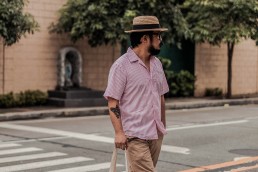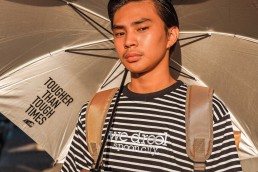
Carlo Delantar has worn many hats as he’s transitioned from one venture to another—country directorship of Waves For Water, founding venture capital firm Core Capital, managing his now three-year stint at the Ellen MacArthur Foundation as a Circular Economy Pioneer, heading circular economy for Gobi Partners, co-managing the Gobi-Core Philippines Fund–an early stage financing enterprise for Filipino technology companies.
And while this mouthful radiates an inhuman amount of discipline and next-worldly vision, beneath all the hats and adornments of this Forbes Asia 30 Under 30 2018 class member is a man transitioning from the humanitarian arena jostling for donations to a venture capital space managing money for independent local and foreign investors. At the end of the day, Carlo is just trying to keep his impact-focused compass intact.
“If I was going to convince myself to do [venture capital],” reflects Carlo, “it would be …somewhere in the impact space. I felt like the idea of using capital to increase the amount of impact exponentially because of the scale of tech was [strong enough] that I couldn’t say no anymore, hence why I’m in this space.”

Switching hats under unprecedented circumstances
During his high school years in Cebu, Carlo took a dash–an action phrase accurate in describing many of Carlo’s decisions–at entrepreneurship, selling hip-hop shirts (Sean Johns and Ecko Unlimited were the flavor of the time), vanity sim cards, and cellular load. “I sold so many,” recalls Carlo. “Every week I would sell [about] five-hundred dollars of shirt and that really started this entrepreneurial sense like, ‘Oh, you can actually do this.’”
While Carlo’s high school days with wads of cash snuggled in tightly wound rubber band cylinders were short-lived, this introduction to the thrill of finding a market and meeting its demand with supply left a lasting impression.
This impression was coiled into the threads of Carlo’s future ventures: Floreia, a sustainable fashion jewelry company; Lifemesh, a blockchain-powered transparency in disaster management platform; and Altum, a design and strategy studio focused on sustainable practice.
“Floreia was first,” Carlo remembers. “When I left, [it] was really profitable. Then my sister took over, and then that was when I met TOMS and became a regional shoe giver. So that taught me about creating a nonprofit, how to rent things, and with no money at all finding sponsors and whatnot.”
Months later, Carlo encountered—to use what we call the word of the last two years—the unprecedented. Typhoon Yolanda, one of the most powerful storms recorded in history, swept the country and millions of Filipinos into pressing circumstances–one of which was a lack of access to potable water. This was the creation of Carlo’s impenetrable magnetism to social impact.
He spearheaded and managed Waves For Water Philippines for seven years as its country director and remains to be a board trustee for the company which has improved the circumstances of over one million Filipinos. During his tenure at the helm, Carlo moved to Manila. “I moved to Manila in 2015 and really set [out] to sort of just pave my path, whatever that meant,” reflects Carlo. “A lot of my work has been [at] the crossroads of social impact in general and sustainability /slash circular economy. [I feel] like I’ve done my time with Waves for Water. My main goal is to make it sustainable and have leadership to run it.”

Photographer — Zaldine Alvaro
Since 2018, Carlo has switched hats, focusing on Core Capital to infuse funds into Philippine start-ups with the view of solving “old inefficiency problems” with new technology. Carlo reflects on the transition: “I guess it’s kind of weird coming from asking for donations and support and then suddenly managing money. I had to figure out what that meant when we were going through that transition. I’m a big fan of tackling injustice, whether just how inefficient the system is, all the way to the transparency of nonprofits.”
Social, environmental, and government impact continue to float around Carlo like dancing electrons around a nucleus as the Core Capital team’s investment decisions continue to be heavily anchored in organizations which are environmentally-prudent, socially-compliant, and progressive. “If not,” says Carlo, “then everything’s just about profit, which doesn’t just make sense to me.”
One trip to Davos, a lifetime of repercussions
In 2017, aged 25, Carlo was one of the youngest people to attend The World Economic Forum in Davos which hosted 3,000 participants from 99 countries. Attendees included António Guterres, the new Secretary-General of the United Nations then, President Xi Jinping of China, Helle Thorning-Schmidt—Chief Executive Officer of Save the Children International and former Prime Minister of Denmark, and the remaining weight of decision makers around the world keeping the balance of society at some sort of equilibrium.
“It really put me on a different map because people took me seriously,” reflects Carlo. “[I learned] two things. One, money is just a tool. And [two], if you communicate properly, you understand who you’re talking to, and you communicate their language, then you can get anything done in the world.”
At some point, one asks: “How do you get to doing all these things?” The answer: a disposition of relentless curiosity, willingness to make dashes, and reaching out to people.
Asked about the people he surrounds himself with, he uses an almost journalistic attitude in his dealing with people. On nurturing these relationships, Carlo says “[I ask] them the right questions. That really helped. Just understanding people’s [stories]. I think stories are probably the most valuable thing for me to understand a person. I definitely have better respect for people after understanding where they come from, where they are now, and what they’re chasing.”
“Sometimes it’s just being upfront. I do this all the time: If I like something that people did, [I’ll message] and say, ‘Hey, I really enjoyed your talk. You know, let’s keep in touch.’ Until now, that’s always been a big asset of mine. There’s nothing wrong just putting something out there. If they say no, “no” is just two letters, right?”

A purposeful business in five years
Carlo has his entrepreneurship bible: “Let My People Go Surfing” by Yvon Chouinard, American rock climber, environmentalist, and founder of Patagonia. Chouinard writes about “using business as a way to channel your passion,” says Carlo.
On starting a business, Carlo says there are two things that must be true at the onset: it must be able to provide economic stability, and you must be able to enjoy it. “I always think about years because whatever your product is from the very beginning, it will change over the years. The fact that there’s a market for it is probably the most important thing. Coming from a nonprofit space [I’m a fan of] figuring out [where] an industry or its supply chain [need] innovation, or how we can be innovative in each step.”

“[And] of course, I have to enjoy it,” says Carlo. “If it’s not fun, I probably wouldn’t do it. There’s definitely the fun component where you know, you’re doing something that you feel motivated no matter what and it keeps you on your toes, keeps you imagining things.”
One of Carlo’s mentors imbued him with the concept of the five-year plan–an essential when creatives embark on putting something, be that a project or business, out into the world. “That five-year plan starts with [understanding the] industry. Second year: build revenue and really make sure you have a good product for your livelihood. Third: make sure you find a way to start [creating] profit. Fourth: bring in a team to professionalize it. And fifth: it’s your time to just take a step back and then let it run.”
One sees this continued effort in Carlo’s work in each of his ventures. “That’s what we did with Waves for Water and a few of my organizations. While [I was] in the midst of the third or fourth year, I was already looking, ‘What’s going to be my next thing?’”
“If an enterprise runs without you then you’ve done a successful job creating a self-sustaining company.”

Staying within the circular economy keeps our biggest fears at bay
Asked about his biggest fear, Carlo draws our attention to the environment. “Climate would be my biggest issue right now. We’re facing an open ocean in the East part of the country. Then we’re dealing with territorial disputes on the West Philippine Sea. Just thinking about Yolanda [which] was almost nine years ago and then every single year we get more than 20 typhoons. Every single time we still have to rebuild.”
Carlo mentions World Overshoot Day, “By June already we overshot the amount of resources we need to be fully self-sustaining in the world.” He continues, “I think it’s only the past two generations [that have] felt climate change. And we never really pinpointed that the reason why we have climate change [is] because of the products and services that were designed before.”
This, with our consequent alarm, presses the urgency of adapting a circular economy deeply into our foreheads. “Circular economy is pretty much sustainability 4.0,” says Carlo. And more businesspeople need to be involved. “You can’t really think about just the environment if you don’t bring in society or people in general and also the proper design policies for whatever you’re creating.”
This is where Carlo’s position as a funder for businesses and head of Circular Economy for Gobi Partners puts him at the curve of the new frontier of business. “How do we use technology to have better resource efficiency? What if we lose that resource? How do we take it, bring it back or cycle it back? Can business be a force to actually create a better circular economy?” With excited curiosity rather than learned condescension, Carlo urges entrepreneurs onward towards this sustainable frontier.
Not all of the over 700 start-ups mapped by Gobi-Core PH Fund (Gobi-Core) in its Startup Ecosystem Report 2021 reach for this frontier, but Carlo recognizes the many directions creatives and entrepreneurs take. “[We’ve missed investments] because we just didn’t get along and that’s completely fine.”


Demystified start-ups
Over the years, amongst outsiders at least, tech-start-up folks seemed like shamans poking at the future working in zany offices at things beyond comprehension. The idea that problems are simply being solved is lost in a sea of IPOs and sudden billionaire statuses and sportscars of every European flourish available.
Carlo fans the fire of our creativity and the possibilities available at the end of our concerted efforts to solve problems through innovation. “There are more problems now than actually problem solvers,” says Carlo. “So, I guess the beauty of the future is there are more people now that are aware and are willing to tackle it.”
Over the next five years, in his transition from the humanitarian to the venture capital space, Carlo will continue his journey, flipping from hat to hat. He and his team are expecting more than a billion dollars of investment to flood the start-up space with possibility.
But his goal in the journey is to remain the same man underneath the adornment–with his moral compass and curiosity intact. “What’s important for me for the next five years is not to lose myself in the process. I think that’s my goal.”
SUPPORT PURVEYR
If you like this story and would love to read more like it, we hope you can support us for as low as ₱100. This will help us continue what we do and feature more Filipinos who create. You can subscribe to the fund or send us a tip.




